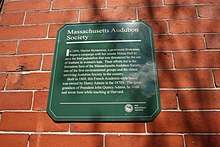Minna B. Hall
Minna B. Hall was an American socialite and environmentalist. Her most notable achievements include the formation of the Massachusetts Audubon Society and the ratification of the Weeks-McLean Act by the US Congress.[1] Together with her cousin, Harriet Lawrence Hemenway, Hall organized ladies' teas at which she urged women to stop wearing hats with feathers.[2] Hall's boycott of the fashion of wearing plumes ultimately changed the future of the American feather trade, and her activism remains a key event in the history of ornithological conservation.[2][3]

Plaque commemorating the foundation of the Audubon Society
Minna lived on Ivy Street in Brookline, Massachusetts for over 90 years. The pond by her house has been preserved as a wildlife sanctuary.[4][5]
References
- "How Two Women Ended the Deadly Feather Trade". Smithsonian.com. Retrieved April 10, 2019.
- "The Feather Trade - Wildlife Journal Junior". New Hampshire PBS. 2019. Retrieved April 13, 2019.
- Weeks, Linton (July 15, 2015). "Hats Off To Women Who Saved The Birds". NPR.org. Retrieved April 13, 2019.
- "Hall's Pond and Amory Woods". The Friends of Hall's Pond. Retrieved April 13, 2019.
- Brookline Conservation Commission, Friends of Hall's Pond (1996). "A Plan for Hall's Pond Sanctuary" (PDF). Friends of Hall's Pond.
This article is issued from Wikipedia. The text is licensed under Creative Commons - Attribution - Sharealike. Additional terms may apply for the media files.